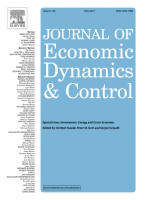Investments, Energy, and Green Economy

13.05.2021
Herbert Dawid (Department of Business Administration and Economics and Center for Mathematical Economics, Bielefeld University); Peter M. Kort (Department of Econometrics and Operations Research & CentER, Tilburg University; Department of Economics, University of Antwerp); Sergio Vergalli (Department of Economics and Management, Università degli Studi di Brescia; Fondazione Eni Enrico Mattei)
Investments, Energy, Green Economy
Journal of Economic Dynamics and Control Volume 126, May 2021
The current pandemic crisis illustrates that the economy can be strongly affected by factors that are not necessarily economic. This highlights the need for a broad perspective in the analysis of economic dynamics, taking into account the role of different interconnected factors. A new paradigm of growth seems necessary to describe and evaluate economic dynamics and results of decisions and policy interventions. To that end the recent concept of “sustainable development” has been put forward, which provides an integrated development between the economy, society and the environment, capable of understanding the future and managing the growing uncertainty. It is based on the insight that a crucial aspect of future development is the management of natural resources. The new sustainable paradigm addresses topics like decarbonization and energy transition, with the aim to contain future climate change crises. The European Green Deal and part of the Next Generation EU funds have been designed in this direction. They are based on the understanding that investments aimed at the Green Economy can reduce environmental impacts, stimulate growth and also better control sources of environmental and economic uncertainty. Already for a long time contributions to the literature have demonstrated that adopting more sustainable and responsible behavior has the great advantage of reducing future risks. In fact, empirical evidence underlines that economic investors reward the most virtuous companies by recognizing a lower business risk. It therefore seems that the path to growth is traced and, in any case, seems almost inevitable to limit damaging effects of future crises.
